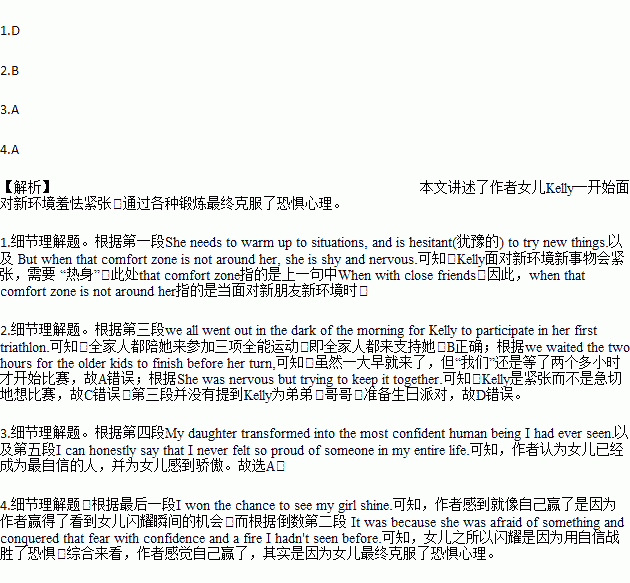题目内容
My daughter Kelly is a cautious person. She needs to warm up to situations, and is hesitant(犹豫的) to try new things. When with close friends, she becomes a leader who laughs loudly and chants. But when that comfort zone is not around her, she is shy and nervous.
This has been challenging for me at times. “Shy” is not a word that I think has ever been used to describe me. But this has been a year of firsts for my girl that has filled her with a new sense of confidence. This year she moved to lap lane (习泳区) in swimming where she was preparing for a swim team. This year she learned to ride a bike without training wheels. And this year she completed her first kids’ triathlon (三项全能).
On Saturday, with a thunderstorm coming soon and my son’s birthday party later in the day, we all went out in the dark of the morning for Kelly to participate in her first triathlon. We practiced transitions from swim to bike to run with her, we got all the equipment she'd need, and we kept talking about the race. But as we waited the two hours for the older kids to finish before her turn, she held my leg a little harder and told me she loved me a few too many times. She was nervous but trying to keep it together.
And then it was her turn. From the second she jumped into the water, my heart soared. My daughter transformed into the most confident human being I had ever seen. She dominated (主宰) that swim, crushed that bike ride and ran to the finish with the biggest smile on her face.
I can honestly say that I never felt so proud of someone in my entire life. It wasn’t because she did a sport or anything like that. It was because she was afraid of something and conquered that fear with confidence and a fire I hadn't seen before.
All day I would find myself just looking over at her and smiling. She might be wearing the finalist medal but I felt like I won that day. I won the chance to see my girl shine. Shine on, sweet baby.
1.Kelly is nervous when .
A. boys are around her B. she changes into a leader
C. she is away from her mom D. situations are new to her
2.We can know from Paragraph 3 .
A. the race began in the early morning
B. the whole family gave Kelly support
C. Kelly was eager for her turn in the race
D. Kelly prepared for her brother’s birthday party
3.Seeing Kelly’s performance in the race, the author felt .
A. excited and proud B. anxious and uneasy
C. worried and hesitant D. curious and concerned
4.In the ending paragraphs the author “felt like I won that day” because Kelly .
A. overcame the fear B. expressed love to her
C. won the gold medal D. took part in the sport

